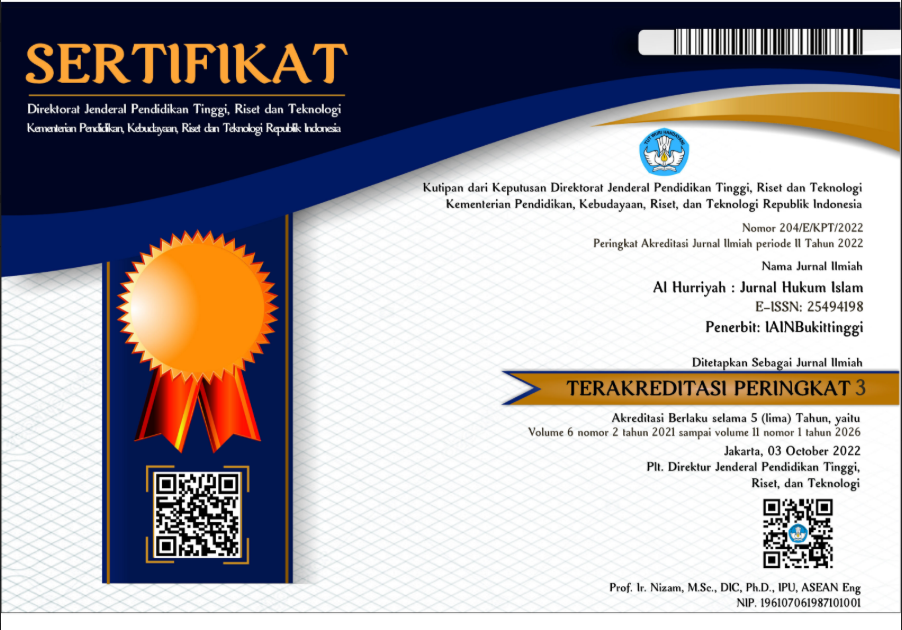NAFKAH IDDAH AKIBAT TALAK BA`IN DALAM PERSPEKTIF KEADILAN GENDER (Analisis Terhadap Hukum Perkawinan Indonesia)
DOI:
https://doi.org/10.30983/alhurriyah.v3i2.720Abstract
Iddah is one of the obligations for a wife who is divorced by her husband, whether divorce is caused by divorce from a husband or because of a wife's lawsuit to the court (khulu '). While undergoing iddah, the wife has the right to obtain housing and living facilities, as is the case in raj'i talak. On the other hand, in the Talak Ba'in, the Islamic marriage law in Indonesia does not provide an opportunity for the wife to earn a living even though she has to undergo the same obligation, namely undergoing iddah and living in her husband's house. This is certainly not in line with gender justice that carries the equality of men and women in this life. Judging from the thoughts of the ulema of the school of thought, actually the legal thinking of Imam Abu Hanifah had first argued to give the wife the right to earn a living in divorce even though the divorce was in the form of divorce. It seems that Imam Abu Hanifah's opinion should be considered in the renewal of Islamic marriage law in Indonesia, especially in realizing justice to the women in their marriage and divorce.
References
‘Âlim, Yûsuf Hâmid al-, al-Maqâshid al-‘Ammah li al-Syarî’ah al-Islâmiyah. Riyâdh, Dâr-‘Alamiyah li al-Kutub al-Islâmi, 1994
Azzam, Abdul Aziz dan Abdul Wahhab Sayyed Hawwas, Fiqh Munakahat (Khitbah, Nikah dan Talak). Jakarta: Amzah, 2009
Bachtiar, Maryati, “Hukum Waris Islam Dipandang Dari Perspektif Hukum Berkeadilan Genderâ€, Jurnal Ilmu Hukum, vol. 3, no.1, 2012
Busyro, “Pengarusutamaan Gender Dalam Pemikiran Hukum Imam Abu Hanifah dan Relevansinya Dengan Pembaharuan Hukum Islamâ€, Al-Hurriyah Jurnal Hukum Islam, vol. 1, no. 1, 2016
Busyro, Dasar-dasar Filosofis Hukum Islam. Ponorogo: Wadegrup Publishing, 2017
Dardiri, Ahmad ibn Muhammad al-, Syarh al-Shaghir, juz 2. t.tp, t.p, [tth]
Departemen Pendidikan Nasional, Kamus Besar Bahasa Indonesia. Jakarta: PT Gramedia Pustaka Utama, 2008
Fakih, Mansour, Analisis Gender dan Transformasi Sosial. Yogyakarta: Pustaka Pelajar, 1999
Ghozali, Abdul Rahman, Fiqh Munakahat. Jakarta: Kencana, 2010
Helmi, Muhammad, “Konsep Keadilan Dalam Filsafat Hukum Dan Filsafat Hukum Islamâ€, Jurnal Mazahib, vol. 14, no. 2, 2015
Hikmatiar, Erwin, “Nafkah Iddah Pada Perkara Cerai Gugat (Livelihood Idda In Divorce Case Sues)â€, Mizan: Jurnal Ilmu Syariah, vol. 4, no. 1, 2016
http://www.wikipediaindonesia.com/pengertian-gender.html Diakses tanggal 17 Juni 2018
Jashâsh, Abû Bakar al-, Ahkâm al-Qur`ân. Beirut: Dâr al-Ihyâ` al-Turâts al-‘Arabi, 1992
Junaidi, Heri dan Abdul Hadi, “Gender dan Feminisme dalam Islamâ€. Jurnal Muwazah. Vol 2. No.2, 2010
Kasânî, Abû Bakar ibn Mas’ûd al-, al-Badâ’i’ al-Shanâ’i’, juz 4. Beirut: Dâr al-Kutub al-Ilmiyah, 2010
Kasim, Nur M., “Perspektif Islam Tentang Genderâ€, Jurnal Inovasi. Vol 9. No.2, 2012
Khariri, “Kesetaraan Gender Dalam Perspektif Islam: Reinterpretasi Fiqh Wanitaâ€, Yin Yang Jurnal Studi Gender dan Anak. Vol. 4. No. 1, 2009
Kompilasi Hukum Islam Tahun 1991
Mulia, Siti Musdah, Islam dan Inspirasi Kesetaraan Gender. Yogyakarta: Kibar Press, 2007
Munawwir, Ahmad Warsono, Kamus Al-Munawwir Arab-Indonesia. Surabaya: Pustaka Progresif, 1997
Purba, Orinton, Konsep dan Teori Gender dalam https://gendernews88.wordpress.com Diakses Tanggal 21 Juni 2018
Puspitawati, Herien, Konsep, Teori dan Analisis Gender. Bogor: IPB Press,2012
Qudâmah, Muwaffiq al-Dîn ibn, al-Mughnî, juz 11. Kuwait: Dâr ‘Alim al-Kutub, 1997
Rasyid, Sulaiman, Fiqh Islam. Bandung: Sinar Baru Algensindo [tth]
Sâbiq, Sayyid, Fiqh al-Sunnah. Beirut: Dâr al-Fikr, 1992
Santoso, Agus, Hukum, Moral dan Keadilan. Jakarta: Kencana Prenada Media Group, 2012
Shan’ânî, Muhammad ibn Ismâ’il al-Amîr al-, Subul as-Salam Syarh Bulûgh al-Marâm, penerjemah, Ali Nur Medan dkk, jilid 3. Jakarta: Darus Sunnah Press, 2013
Suyûthî, Jalâl al-Dîn al-, al-Jâmi’ al-Shaghîr. Bandung: al-Ma’arif, [tth]
Syarifuddin, Amir, Hukum Perkawinan Islam di Indonesia. Jakarta: Kencana, 2009
Umar, Nasarudin, Argumen Kesetaraan Gender Perspektif Al-Qur’an. Yogyakarta: Kreasi Wacana 1999
Undang-Undang Nomor 1 Tahun 1974 Tentang Perkawinan
Zuhaylî, Wahbah al-, al-Fiqh al-Islâmî wa Adillatuhu, Juz 7. Beirut: Dâr al-Fikr, 1989
Downloads
Published
How to Cite
Issue
Section
Citation Check
License
Authors who publish with this journal agree to the following terms:
- Authors retain copyright and grant the journal right of first publication with the work simultaneously licensed under a Creative Commons Attribution-ShareAlike 4.0 International License that allows others to share the work with an acknowledgment of the work's authorship and initial publication in this journal.
- Authors are able to enter into separate, additional contractual arrangements for the non-exclusive distribution of the journal's published version of the work (e.g., post it to an institutional repository or publish it in a book), with an acknowledgment of its initial publication in this journal.
- Authors are permitted and encouraged to post their work online (e.g., in institutional repositories or on their website) prior to and during the submission process, as it can lead to productive exchanges, as well as earlier and greater citation of published work (See The Effect of Open Access).





